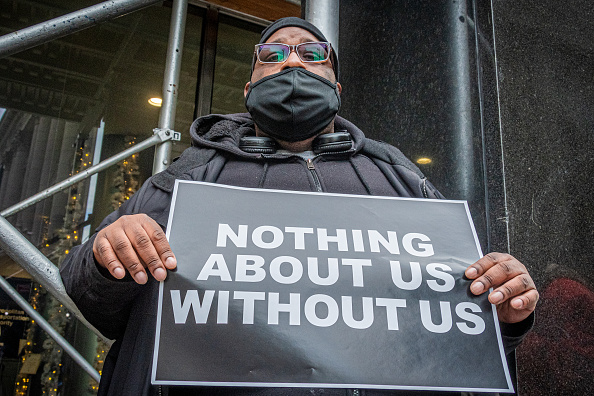The shared struggle for equality faced by people with disabilities and people of color continues today. People with disabilities, especially those from other marginalized communities, experience multiple forms of discrimination and exclusion due to their disability, race, religion, and more. They face significant barriers to accessing health care, education, employment, and public spaces. Black people with disabilities are also disproportionately incarcerated, experience higher rates of poverty than other racial groups, and are at greater risk of violence and abuse.
People of color with disabilities also face significant threats to their voting rights. For example, the Legal Defense Fund is currently challenging SB 1, a Texas law that would significantly restrict voting access and make it harder for Texans to vote, particularly Black and Latino voters and voters with disabilities.
As outlined in LDF’s press release announcing the lawsuit on September 7, 2021, in addition to alleging that the law violates multiple constitutional amendments and Section 2 of the Voting Rights Act by “intentionally targeting and burdening the voting methods and means used by voters of color,” the lawsuit alleges that SB1 violates the Americans with Disabilities Act, Section 504 of the Rehabilitation Act of 1973, and Section 208 of the Voting Rights Act. The lawsuit claims that SB1 “[es] “Voting barriers discriminate against voters with disabilities and deny people with disabilities a full and equal opportunity to participate in the state’s voting program,” the press release said.
All of the systemic issues mentioned above are rooted in societal bias, racism, and ableism that result in disabled people of color being disproportionately excluded from mainstream narratives and opportunities. The disability rights movement continues to fight to remove these barriers and ensure equal access and rights for all individuals.
To achieve true equality and justice, it is essential to address the issues faced by people of color with disabilities. This requires a multifaceted approach that includes policy reform, community engagement, and intersectoral advocacy. Efforts should be directed at removing barriers to healthcare, promoting inclusive education, addressing economic disparities, and amplifying the voices of people of color with disabilities in decision-making processes.

